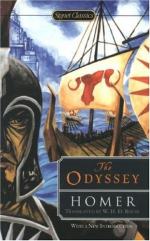time of Solon. If, in the absence of evidence,
we may venture upon naming any more determinate period,
the question at once suggests itself, What were the
purposes which, in that state of society, a manuscript
at its first commencement must have been intended
to answer? For whom was a written Iliad necessary?
Not for the rhapsodes; for with them it was not only
planted in the memory, but also interwoven with the
feelings, and conceived in conjunction with all those
flexions and intonations of voice, pauses, and other
oral artifices which were required for emphatic delivery,
and which the naked manuscript could never reproduce.
Not for the general public—they were accustomed
to receive it with its rhapsodic delivery, and with
its accompaniments of a solemn and crowded festival.
The only persons for whom the written Iliad would be
suitable would be a select few; studious and curious
men; a class of readers capable of analyzing the complicated
emotions which they had experienced as hearers in
the crowd, and who would, on perusing the written
words, realize in their imaginations a sensible portion
of the impression communicated by the reciter.
Incredible as the statement may seem in an age like
the present, there is in all early societies, and
there was in early Greece, a time when no such reading
class existed. If we could discover at what time
such a class first began to be formed, we should be
able to make a guess at the time when the old epic
poems were first committed to writing. Now the
period which may with the greatest probability be fixed
upon as having first witnessed the formation even
of the narrowest reading class in Greece, is the middle
of the seventh century before the Christian aera (B.C.
660 to B.C. 630), the age of Terpander, Kallinus,
Archilochus, Simenides of Amorgus, &c. I ground
this supposition on the change then operated in the
character and tendencies of Grecian poetry and music—the
elegiac and the iambic measures having been introduced
as rivals to the primitive hexameter, and poetical
compositions having been transferred from the epical
past to the affairs of present and real life.
Such a change was important at a time when poetry
was the only known mode of publication (to use a modern
phrase not altogether suitable, yet the nearest approaching
to the sense). It argued a new way of looking
at the old epical treasures of the people, as well
as a thirst for new poetical effect; and the men who
stood forward in it may well be considered as desirous
to study, and competent to criticize, from their own
individual point of view, the written words of the
Homeric rhapsodies, just as we are told that Kallinus
both noticed and eulogized the Thebais as the production
of Homer. There seems, therefore, ground for
conjecturing that (for the use of this newly-formed
and important, but very narrow class), manuscripts
of the Homeric poems and other old epics,—the
Thebais and the Cypria, as well as the Iliad and the
Odyssey,—began to be compiled towards the




